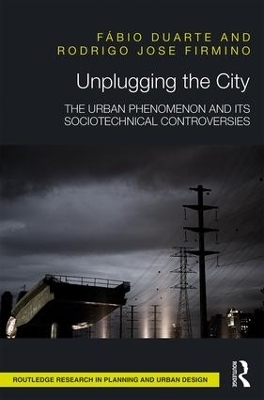
Unplugging the City
Routledge (Verlag)
978-1-138-69682-2 (ISBN)
Modernity has entrusted technology with such power that it is treated as an autonomous entity, with its own manners and morals. Technological disruptions are also socially disruptive: technological failures reveal both the constituents of the technology itself and the social fabric woven by this technology. Cities are the quintessential technological arrangement, not only materially but also as a conceptual framework: the ubiquity of technology makes us think and plan cities mostly in terms of technological arrangements.
Unplugging the City: The Urban Phenomenon and its Sociotechnical Controversies proposes a conceptual and methodological framework for analyzing certain urban phenomena as a technological assemblage. It demonstrates, through multiple case studies, the sociotechnical complexities involved in the stabilization and disruption of urban technological arrangements. Examples range from the urban phantasmagorias portrayed in science-fiction movies to the urban proposals of Brasilia and Masdar, from the book of bike-sharing systems to pervasive global surveillance systems.
Written by Fábio Duarte and Rodrigo Firmino, based on their original research and publications, this is an essential resource for those interested in the theory and study of technology and its inextricable influence on the city.
Fábio Duarte is a scholar and research lead at the Massachusetts Institute of Technology Senseable City Lab and professor at the Pontifícia Universidade Católica do Paraná (PUCPR), Brazil. Duarte is an urban planner with a PhD in Communications from the University of São Paulo, Brazil, and has been a research associate at Harvard Graduate School of Design. Rodrigo Firmino is professor in urban management at the Pontifícia Universidade Católica do Paraná (PUCPR), Brazil. Firmino is an architect and urban planner with a PhD in Urban Planning from Newcastle University, UK, and has been a visiting scholar at the University College London (2015), and a postdoc fellow at the University of São Paulo (2004).
Foreword Introduction From Shared Wheels to Controlled Spaces Chapter 1 Unplugging the City: Mobility and Territorialization of Urban Sociotechnical Systems Chapter 2 Disassembling Bike-Sharing Systems: Surveillance, Advertising, and the Social Inequalities of a Global Technological Arrangement Chapter 3 Learning from Failures: Unearthing Rail Proposals in Curitiba's Bus Rapid Transit Chapter 4 Driverless Cars: Glossing the Rugged Pavements Ahead Chapter 5 Constructing New Invisible Territories through the Monitoring of People and Spaces Chapter 6 The Weakest Link: Unplugging Digital Territorialities Chapter 7 Planning Delusion: Between Prescription and Provocation Chapter 8 Urban Phantasmagorias: The Immanent Cities of the Future Chapter 9 Folie à Deux - A Salute to Mark Weiser
| Erscheinungsdatum | 11.11.2017 |
|---|---|
| Reihe/Serie | Routledge Research in Planning and Urban Design |
| Zusatzinfo | 1 Tables, black and white; 22 Halftones, black and white |
| Verlagsort | London |
| Sprache | englisch |
| Maße | 156 x 234 mm |
| Gewicht | 453 g |
| Themenwelt | Naturwissenschaften ► Biologie ► Ökologie / Naturschutz |
| Naturwissenschaften ► Geowissenschaften ► Geografie / Kartografie | |
| ISBN-10 | 1-138-69682-X / 113869682X |
| ISBN-13 | 978-1-138-69682-2 / 9781138696822 |
| Zustand | Neuware |
| Haben Sie eine Frage zum Produkt? |
aus dem Bereich


